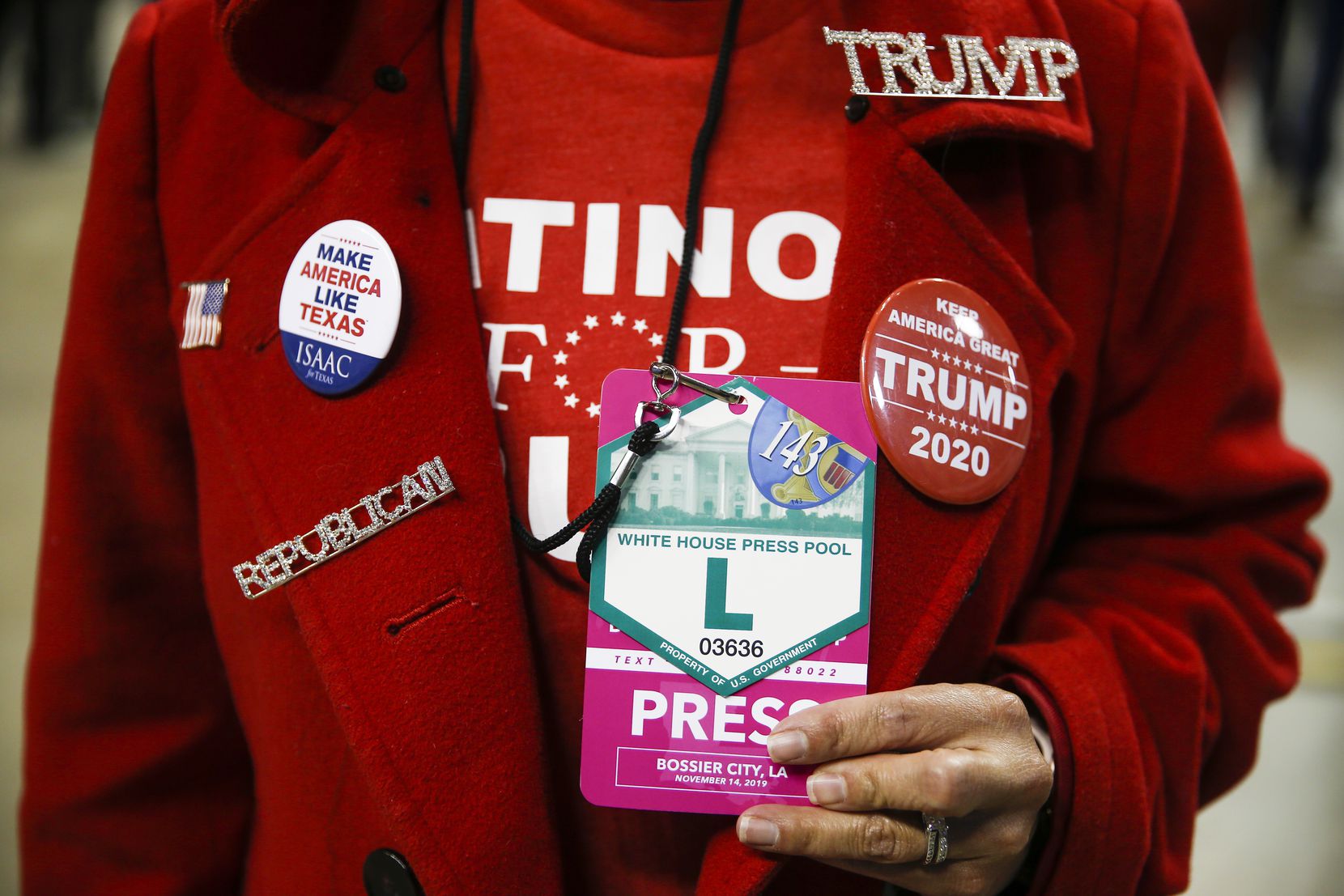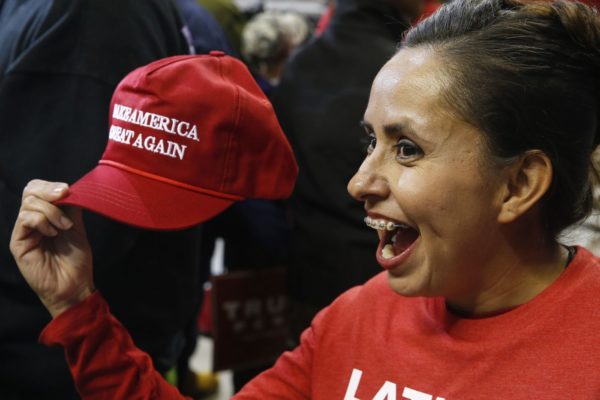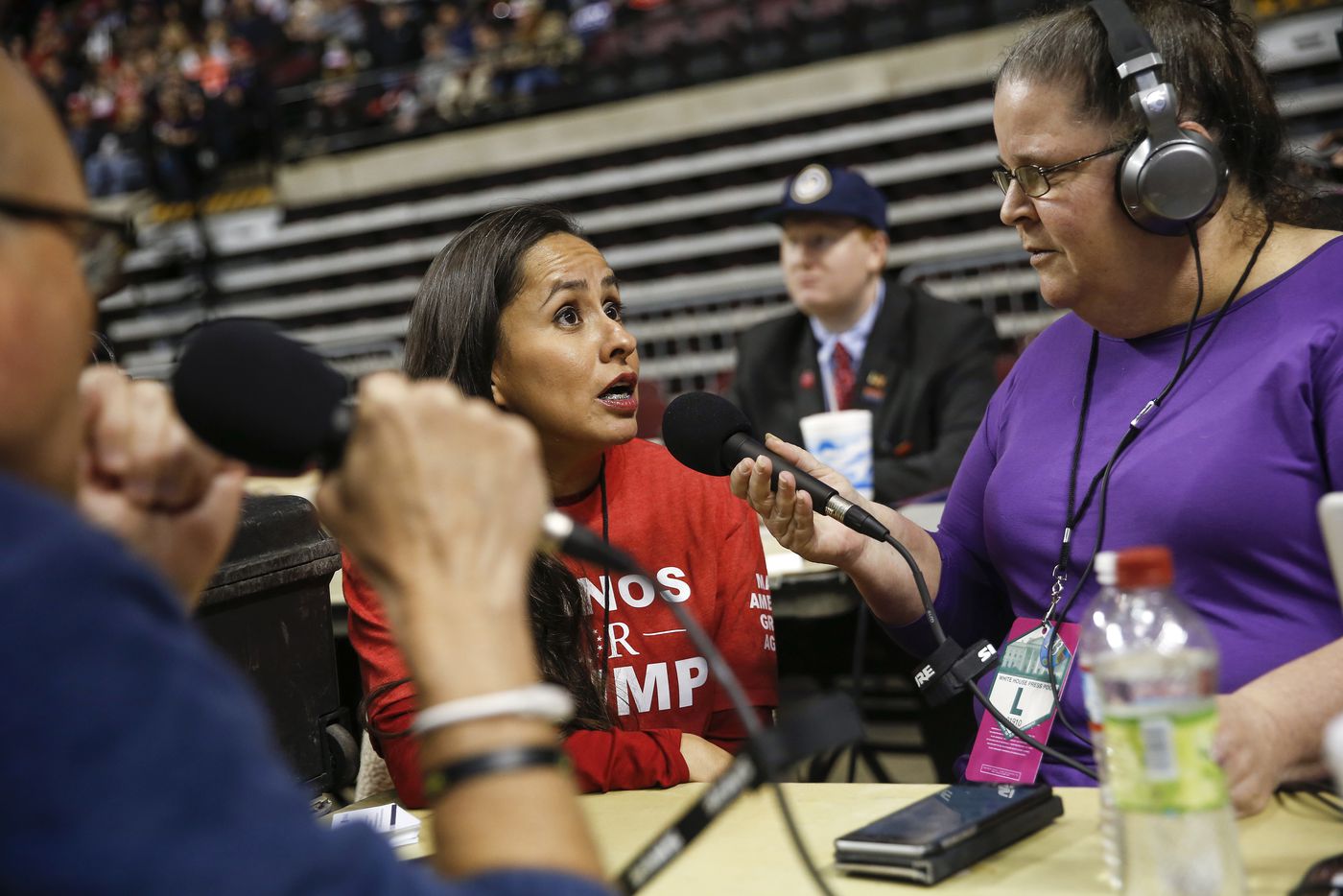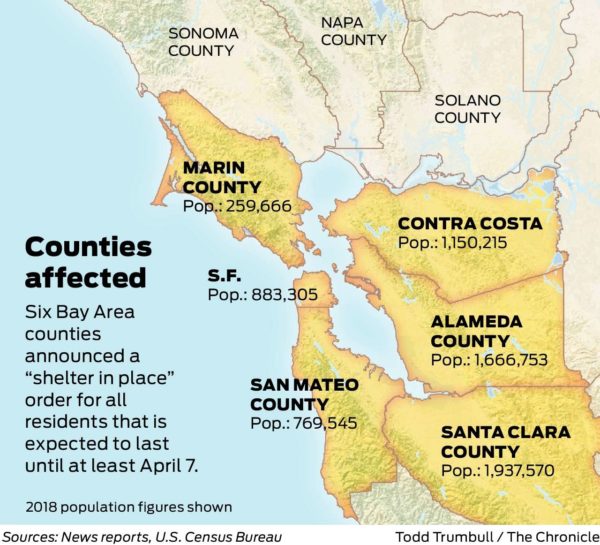On the day Martha Doss became a U.S. citizen in 2017, she couldn’t stop thinking of her mother.
“She wanted to desperately be an American,” she said, remembering the woman who brought her and her twin sister from Mexico to the United States when they were children in the mid-1980s.
Becoming a citizen meant her mother’s dream of a better life for her children had, in some way, been fulfilled.
It also meant that in 2020, Martha could vote in what will likely be one of the most contentious and hard-fought presidential elections.
And on that day in 2017 when Martha pledged to “support and defend the Constitution and laws of the United States of America against all enemies, foreign and domestic,” she knew exactly whom she would vote for: Donald Trump.
While many Latinos across the country abandon the Republican Party, Martha reflects the complexities of the Texas electorate on the eve of the 2020 election. Observers are watching carefully, wondering if this is the time Democrats can win in a state that has been loyal to Republicans for decades.
Democrats have made significant inroads among the state’s traditionally conservative Latino population that is growing, getting younger and more progressive.
But there are still men and women like Martha who are holdouts for the GOP. That a Latina and new American would so enthusiastically back a politician whom many see as demonizing immigrants surprises some, Martha knows. But her deeply held religious beliefs have led her to the Republican Party. And she is more offended by how she says Democrats take votes from black and Latino people for granted.
“It’s always about identity politics with them,” she said. “If you are Hispanic or you’re black or you are LGBTQ, then you automatically have to be a Democrat. And for me, that’s not it. If I look at both platforms, as a woman of faith, my Christian values align more with being a conservative.”
Census data and polling suggest Martha is the exception, not the rule. While Texas Latinos tend to be more conservative than their peers in California or Arizona, polling has found 77% say Trump and his policies will “set back” progress made by Latinos and 97% say Trump has said or done something to make them angry.
And so, Martha, a 37-year-old mother of four from San Marcos who loves to wear her Trump swag and accent any outfit with the American flag, proves that the Latino voting bloc is not monolithic. She represents a demographic that isn’t often heard from: conservatives of color.

‘Sometimes, I think I’m crazy’
Since Trump was elected in 2016, Martha has crisscrossed the state attending his rallies and communing with the president’s supporters.
A prolific Facebook user, Martha and her social media content have attracted the attention of local, state and national Republicans alike. Among her fans is Texas Agriculture Commissioner Sid Miller, who shared a photo of Martha from Trump’s October Dallas rally in which she holds a sign that reads: “Became A US Citizen In 2017 Voting For Trump 2020!”
“Thank you Martha Doss for doing it the right way!” his caption in part reads.
The rising social media star in conservative circles was asked by the Republican National Hispanic Assembly to attend a rally in mid-November in Bossier City, La., where Trump marshaled support for the Republican gubernatorial candidate, to create content the group could use on Facebook and Twitter.
At 4:30 on the morning of the rally, Martha frantically tried to leave her mother-in-law’s Georgetown house with her husband, Wesley, so they could get to Louisiana.
Harrison, her 2-year-old son, was crying. She hated leaving him. But Martha and Wesley were already behind their typical Trump rally schedule. In the past, Wesley, a stout sheriff’s deputy with graying hair, would wait in line the night before, with Martha joining him before dawn to ensure they got some of the best seats in the house.
“I felt horrible,” Martha said. “Sometimes, I think I’m crazy … absolutely insane to drop what I’m doing to go see this president.”
At the Bossier City rally, the 4-foot-10-inch Trump supporter was a human pinball, ricocheting from one group to the next, introducing herself, running up and down the bleachers, high-fiving strangers, praising Trump, criticizing Democrats, taking selfies and videos.
“Why aren’t you up dancing?” she asked a group of women sitting in the bleachers. She tried on one woman’s American flag sunglasses, and she shared her immigration story with some men sitting next to them. More selfies.
“If I could talk to every single one of these people and hug them and tell them that I love them for supporting our president, I would,” she said.
And they loved her.

Later in the evening at the rally, a local talk radio station asked her to do an interview.
Teri Netterville, a conservative radio personality from Shreveport, listened from the across the table. Martha mesmerized her.
She teared up as Martha shared her mother’s story: “She worked three jobs. She never depended on government health care. My mother came here and wanted to become an American.”
After the interview, Teri rushed to Martha.
“Your story touched all of us. We need your voice,” Teri said.
Martha makes a point at these rallies to find people who look like her. It’s important for them to know they aren’t alone, she said — a more difficult task in Louisiana. Unlike the rallies in Texas, the Louisiana gathering was overwhelmingly white.
She managed to find a 16-year-old boy whose parents emigrated from Mexico. They exchanged a few words in Spanish. Later, Martha made Wesley give the teen his Trump hat.
And she approached Mac Brown, a 23-year-old black man from Shreveport. They commiserated over being ostracized by their families.
“There was a point in time I’d get offended, but now I don’t,” she told Mac. “Now, I realize they’re just not informed. … A lot of people in my culture are Democrat by default.”
Martha has lost several close relationships because she supports Trump. A family member attacked her on social media. Lifelong friends have stopped speaking to her.
Being a Latino Trump supporter can be a lonely experience, even in Texas, where Latinos have a history of supporting Republicans.
In 1998, Texas Gov. George W. Bush said he received 40 percent of the Latino vote. Although political scientists at the time suggested the number was lower, Bush’s support among Latinos was nevertheless much higher than that of his peers.
However, no Republican can count on that sort of groundswell from Latino voters these days, said Albert Morales, senior political director for Latino Decisions, a national group that researches Latino voting trends and opinions.
“The days of Republicans getting 40% of the Latino vote are over,” he said. “Latinos have now linked the GOP brand to racism. It’s just irrefutable.”
According to Latino Decisions, Texas saw the largest surge in Latino voters ever in the 2018 elections, and they overwhelmingly supported Democrats, especially in high-profile U.S. House races.
Latinos can have an even greater influence on the 2020 election, Morales said. There are about 3.7 million voting-age Latinos in Texas who have never participated in an election and nearly 400,000 more who will be eligible to vote this year.
“You have 4 million Latino voters sitting on the sidelines that can be registered or mobilized,” Morales said. “And nine times out of 10, they’re going to vote Democratic.”
The question is whether Democrats can harness that untapped potential, especially since young people tend to vote at a lower rate.
Dallas County Republican Chairman Rodney Anderson said it’s premature to suggest Texas Latinos will abandon the GOP outright in 2020. He said the party has worked not only to recruit Latino voters, but candidates such as Luisa del Rosal, a millennial immigrant from Mexico who is running for a state house seat in North Dallas.
“The party infrastructure itself is reaching out to communities of color and voters who understand that the Democratic Party is moving extremely far left,” Anderson said. “And that is not acceptable to communities that value traditional family values, which most Latino voters’ families are.”

‘God is using him’
Martha was introduced to politics by her friend Naomi Narvaiz, a fellow small-business owner active in local GOP politics.
In 2016, Naomi took Martha to see her sister-in-law Susan Narvaiz, the former mayor of San Marcos and a candidate for Congress, deliver a speech. In that address, Martha said, she heard Susan talk about her opposition to abortion. Everything clicked.
It was the first time Martha, who says she believes God wants her to fight for the unborn, had heard the issue of abortion in a political context. She knew at that point she was a Republican.
That Trump has appointed so many conservative judges to the federal courts is the cornerstone of why she supports him.
Trump’s rise through the Republican Party has been bolstered by support from evangelicals, who make up about 25% of Republican voters. Martha, who attends two Pentecostal churches, is among that group.
She is totally aware of Trump’s indiscretions, including a history of infidelity, questionable business practices and of course, the infamous tape of him bragging about the power of his celebrity, that he can grab women’s genitals without getting into trouble.
As Martha sees it, he is a man and men make mistakes.
“I’ve done things in my past. We all have done things we regret,” she said. “I just firmly believe that God is using him. Things can be overlooked because we all fall short of the glory of God. Yeah, they happened. But they didn’t happen during his presidency. Had these things happened during his presidency, we’d have a problem with it.”
Things have happened in his presidency. On Dec. 13, Trump became the third president to be impeached by the U.S. House.
On impeachment, Martha takes her cues from Trump, who has decried the proceedings as a “witch hunt” driven by the Democrats and the media.
Martha’s adoration for Trump does not extend to all Republicans. She is running for office in the Hays County Republican Party, which she said needs new leadership and more diversity. And she said she’s prepared to vote out any Republican who doesn’t support abolishing abortion.
So to Martha, everything boils down to the fact that Trump has kept his promises.
“I love the fact that he promised he would secure our border,” she said. “He promised that he would defund Planned Parenthood. He promised that he would bring our jobs back and build our economy and he has fulfilled every single one of the promises.”

‘I get to live the American dream’
Martha embraces the chance to put a different face on the Republican Party — and immigration.
Martha was born in Durango, Mexico, in 1982. When she was about 3, Martha’s mother, Socorro Jimenez, headed to Texas to join her own parents, taking with her Martha and her twin sister.
Socorro’s parents were permanent residents. They petitioned for Socorro and her children to have legal status in the United States.
Socorro applied for residency. But like so many immigrants hoping to gain legal status through a family member, she faced a lengthy backlog. For work, she cleaned homes and offices and helped out at other family businesses. She learned English and raised her children to respect the American flag, Martha said.
Martha ultimately would make quicker progress toward legal status than her mother. At 18, she got a work permit and later residency through her first marriage.

Six years later, Martha’s mother was battling cancer. She was curious to know the status of her own residency application. So, the family checked, only to learn Socorro still had a year or two before getting residency.
Socorro lost her battle with cancer, never becoming a legal resident. Her packet from the immigration office approving her application would arrive at Martha’s grandmother’s house after she died, Martha said.
“My mom wanted to do everything the right way,” she said. “Our whole immigration system is broken.”
Today, Martha’s family has a wide range of statuses in the U.S. While Martha is typically outspoken, when it comes to discussing her own family’s immigration, she is less forthcoming, sensitive to her family’s privacy.
Martha says she has sympathy for her contemporaries, the Dreamers, unauthorized immigrants brought to the United States as children. And at the same time, she believes the steps President Barack Obama took to protect those young people were outside the scope of presidential power.
Despite actions by the Trump administration to crack down on people entering the country from the southern border and making it increasingly more difficult to become citizens, Martha believes Trump wants to improve the system. It is Congress’ fault for dragging its feet, she said.
And she is confident that after Trump is reelected, he’ll deliver.
“Within the next four years, something big will happen with immigration.”
She has pledged to use her growing platform to advocate for families like hers.
“I get to live the American dream,” she said. “And every single day, I hope that the things that I’m doing make my mom proud.”







